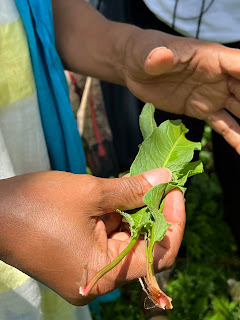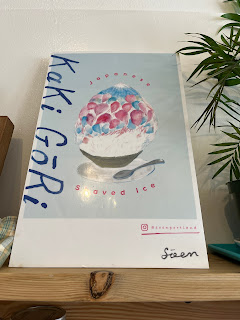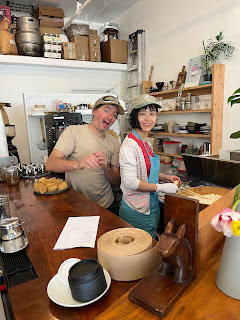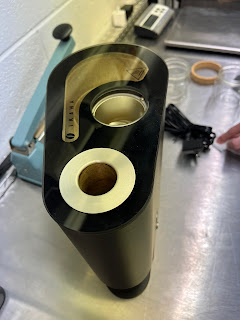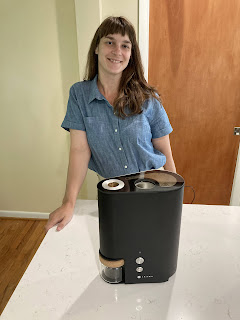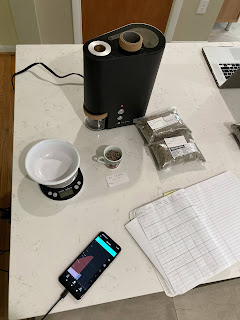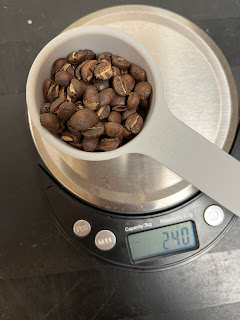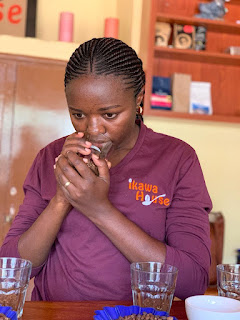Sep. 2023
Jobs in rural communities which grow coffee
are often for low paying field and mill labor with little opportunity for
advancement - especially for women.
To support the growth of professional opportunities for women in coffee and at the same time close the talent gap observed in cooperative management teams, Artisan Coffee Imports has developed a Talent Partnership with our
producing cooperatives. Now in its third cycle, Artisan is supporting Angelique
MUTUYIMANA, 25 years old, who is working with the Co-operative des Caféicultureurs de Gishoma
(COCAGI) in Rwanda’s south. Each month, she travels 4 hours by bus (one way) from her home in Nyamagabe two times! The coopertive's location borders with DR Congo and Burundi. Before starting her internship, Angelique had never been to this region of Rwanda.
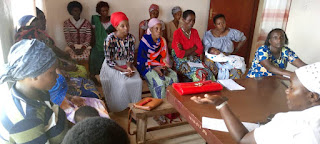 |
| Meeting of Agasaro leaders |
As part of her work to support the COCAGI’s women’s
group, which is called Agasaro, Angelique is involved in all parts of the
coffee growing and processing process. She is as comfortable in the greenhouse,
tending young coffee plants, as she is practicing agobiado tree-bending in the
field.
You’ll also find her at COGAGI’s wet mills or the
cupping lab, where she participates in regular cuppings to ensure that the
Agasaro green is meeting our quality standards.
“I’m learning a lot at COCAGI. It’s exciting for me to
be supporting a coffee cooperative and especially the women of Agasaro,”
Angelique said. “I enjoyed learning about advanced methods to improve
productivity like pruning and the agobiado technique. In the lab, I enjoy
roasting and cupping with the COCAGI staff and our customers.”
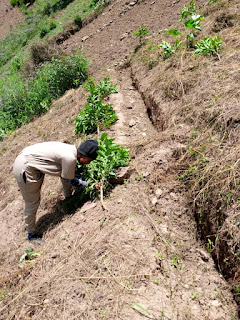 |
| Angelique practicing agobiado |
When Angelique finalizes her year-long internship in
December 2023, she’ll have some exceptional real-world coffee experience to
complement the classroom training she received back in January/February at
Ikawa House. At this coffee training center in Kigali, Angelique and other
students were taught by veteran, world-class cuppers
Laetitia MUKANDIHIRO and Uzziel HABIMANA. They cover much more than cupping, though.
Students learn production techniques of coffee, and go through processing
techniques, roasting and brewing skills.
Angelique earned her bachelor's in Crop
Production from the University of Technology and Arts of Byumba in 2022.
(Byumba is a northern city in Rwanda). Her skills like speaking Kinyarwanda and
English, as well as her experience with government agriculture extension
offices and the "Green Gicumbi Project" are what helped her be
selected by Artisan from a field of other candidates back in December 2022.
 |
| With Ikawa House instructors |
Since March 2023, Angelique has helped with many aspects of agronomy for the cooperative. Patricie UWIZEYIMANA is the interim Executive Secretary (leading staff person) of the cooperative, but this is a new position for her. She had been the cooperative's head agromomist until December 2022. "Angelique's help is very welcome," explains UWIZEYIMANA. "With her help we are better able to support our farmer members and accomplish the many tasks of cooperative agronomists. As interim Executive Secretary I have very little time to go to the field, but I can send Angelique." The arrangement financially is what Artisan considers "tri-funded", meaning three parties contribute to make the internship work. Artisan funds Angelique's expenses for transportation and living while she is at the cooperative. The cooperative agrees to supervise Angelique and involve her in valuable work and this is formalized with an MOU between the cooperative and Artisan Coffee Imports. Angelique volunteers, or rather "invests" her time.
Angelique's internship is the third one Artisan has created and sponsored. So far we've had excellent results. Intern Grace IZERWE, 2020 - 2021, worked with Kopakama Cooperative in Rutsiro district, which included some support to their women's group, Ejo Hez. Now Grace is the Kopakama chief of production and dry mill manager.
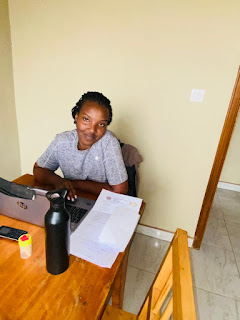 |
Alice - now the Biz Intelligence
intern for Dukundekawa |
Intern Alice NSHUTI, 2022 intern, worked with Dukundekawa and their women's group Rambagirakawa. She is now the Business Intelligence intern for the coopertive located in Rwanda's Gakenke district. This is an important position as it is supporting the cooperative's effort to join a tranparency data project of Root Capital.
Intern Grace IZERWE, 2020-2021 intern, worked with Kopakama cooperative and their women's group Ejo Heza. She is now Chief of Production and Dry Mill Manager for Kopakama, in other words, employed by the coop with as permanent staff.
 |
Grace gives a tour at
Kopakama's dry mill. |
"At Artisan, we believe these internships are concrete ways to support advancement of gender equity in the coffee supply chain," says Ruth Ann Church, Artisan's president, "and at the same time, we're supporting cooperatives to upgrade their management capacity. We firmly believe all management teams are better when they are more diverse. We see talented young women working hard to get through secondary school and earn a degree, and they want secure, professional jobs. Some of them, like Grace, Alice and Angelique, express a great desire to help their fellow Rwandans in rural areas and they have that strange, strong attraction to the coffee industry that many of us experience!"
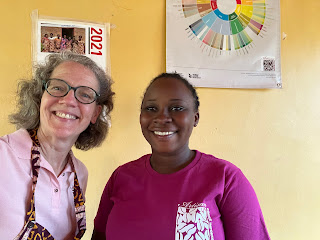 |
| Ruth with Grace at Kopakama |
"When I travel to the processing centers and cooperatives in the rural areas I also see how desparately the education, communication skills and passion of these young professionals are needed. Every cooperative I've visited has a deficit of skilled, university educated workers. The Artisan internship is an attempt to match the demand for talent at cooperatives with the eager, younger generation of women who face many barriers to entry to the coffee sector."
Note: many women do work at the "lowest" levels of labor with the lowest wages and the least job security. Their work needs to be recognized and uplifted. We also have learned that these jobs are valued opportunities for these women. Many women in rural areas need day labor employment opportunities to help make ends meet. Day jobs in coffee, like sorting green coffee at the dry mill or turning coffee on the raised tables at the washing station, can support livelihoods and families in important ways.
We hope that the contributions of women at these important day jobs will be valued, not invisible. And we believe that the advancement of women into decision-making positions in the coffee industry will help the global coffee industry address the challenges of creating more equitable supply chains.
 |
| Grace (L) met Alice (center) and Artisan colleague, Theoneste (R), in Oct. 2021 |
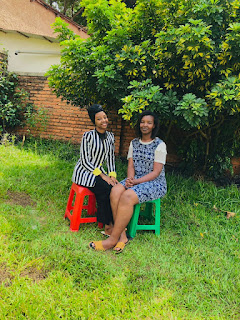 |
| Incoming intern Angelique (L) met intern "alumna" Alice (R), Jan. 2023. |




